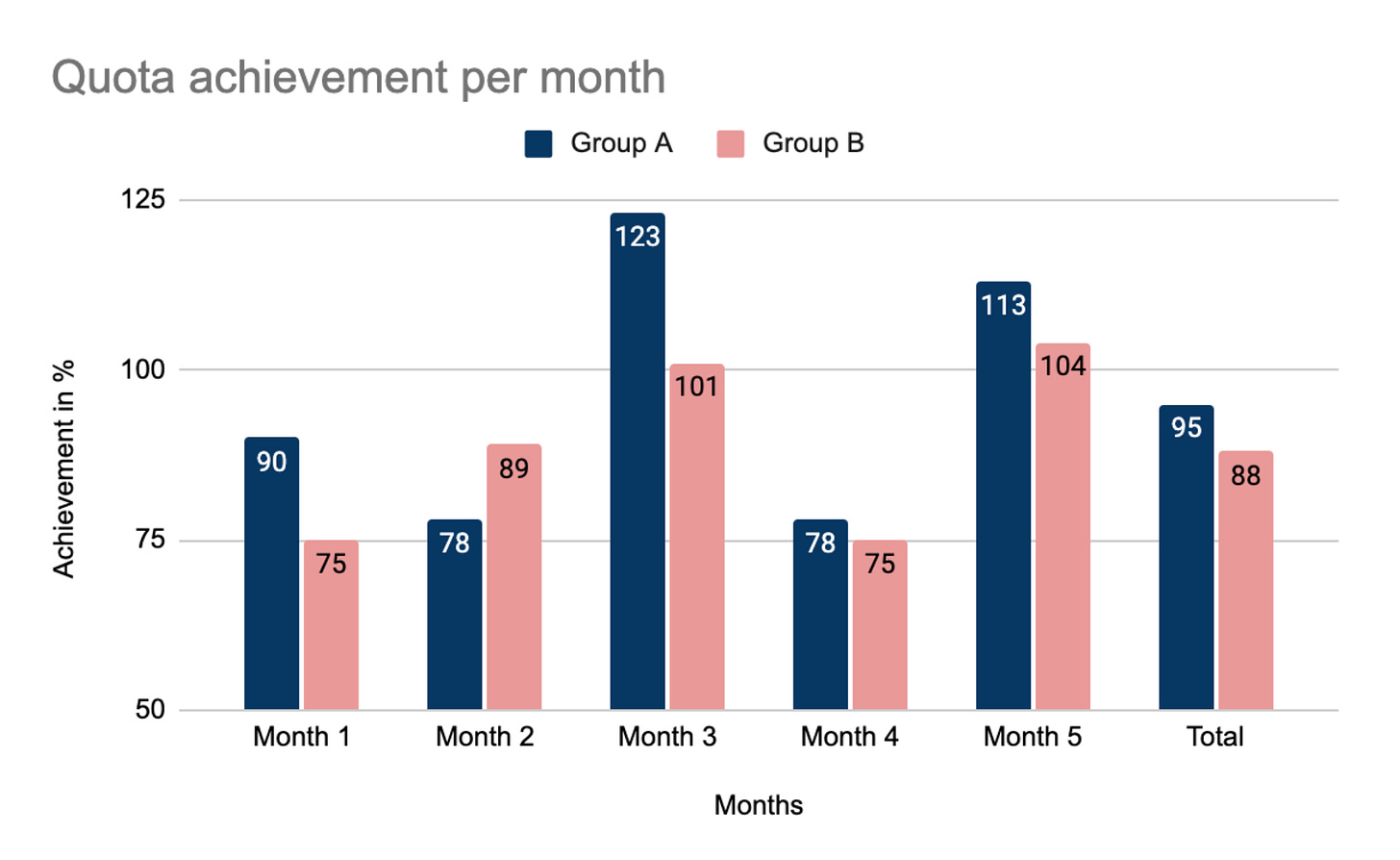Call Coaching: when was the last time you had a feedback session?
Sales who receive consistent feedbacks on their calls hit +44% quota achievement.
Sales is an increasingly challenging job.
Fast-paced companies run today's world.
Sales scopes require multi-disciplinary competencies.
The number of stakeholders involved in the B2B sales process went from 5 to 11 in the last decade.
On average, we stay less than two years in our job → a low tenure to acquire and master competencies.
Middle-management roles are increasingly crucial.
We could argue it has never been so complex to perform sales jobs, both as individual contributor and as manager.
Yes → It is essential to agree that both "parties" are being challenged.
Job descriptions don't match the expectations.
As an individual contributor, you are hired to achieve your goals.
Over time, you develop your rhythm, your style, and you start having your own methodology. You "know" what works best and what does not. While being incentivized by your manager to do more.
But 78% of non-satisfied Sales said they don’t receive enough feedback and coaching from their manager.
As a manager, you are responsible for your team's achievement. You will most likely focus on performances, outputs reporting, and the direction you want your team to take. While being challenged by the top management and internal teams.
But 71% of Managers receive no formal training before doing the job.
The reality is that we all Wish for Change, but we do not Want To Change.
And let's get something out of the way: time constraint is not why Sales are not being coached.
If coaching is not part of your weekly rhythm, you haven't understood your role as a Manager. Same goes for Sales who do not take care of their self-development.
The reality lies in three principles:
People do not like being coached. It is sometimes associated, wrongly, with micro-management. It's easier to blame the manager.
Managers do not know how to coach. It can be stressful if you don't want to expose yourself. It's easier to focus on outputs, while call coaching is heavy lifting and implies teamwork on inputs.
Most companies haven't fully integrated the culture of feedback and coaching as a pillar of success. They might say it, but the reality is different.
We ran a study to measure the impact of call coaching on performance. The outcomes should convince you to give and receive feedback.
To do so, we created a "Call Scorecard": a structured template of aspects to assess during the calls (introduction, closing, discovery, objections handling, preparation, follow-up, etc.).
1 Scorecard = 1 Call which led to feedback and coaching between Sales and Manager.
Managers would rank each element of the Scorecard, automatically generating a total score ranging from 0 (not good) to 100 (perfect) for each call.
After some initial tests, Managers would expect their teams to score 80. Any score below would not meet the company's expectations.
We worked with 14 Managers and 106 Sales (BDR's, AE's & AM's).
Group A: 53 Sales received call coaching.
- Sub-group A1: 26 Sales received at least 2 Scorecards.
- Sub-group A2: 27 Sales received 1 Scorecard only.
Group B: 53 Sales didn't.
Fair split between the two groups in terms of average tenure in the company, total years of experience, country, etc. Outcome 1/4: Call quality can be increased quickly.
When conducting the 1st Scorecard, you noticed that the quality was below expectations (at 66 on average).
After 3 Scorecards only, it jumped to 82, meeting expectations.
You notice the “Learning Curve” effect where there is a drop (higher expectations) from Call #4 to Call #6.
After 8 calls, the score obtained by sales lands at 90, that’s a +36% between the first session and the last one.
Bottom line: Sales being coached increased their call quality while gaining in comfort and confidence.
Outcome 2/4: Higher quality leads to higher performance.
Group A (who received coaching) outperforms the Group B (no coaching) 4 months out of 5.
At their peak, they achieve 123% of their quota when Group B only 104%.
In total, they generated +7pts quote achievement on the period.
Outcome 3/4: Consistent Coaching is the determining factor.
Interestingly, Group A1 (Sales who received at least 2 Scorecards) massively outperformed the others, including Group A2 which received only 1 Scorecard.
“Being coached” only once can be even worst and counter-productive.
Going deeper, we observed that Group A2 was getting “Do as I say” coaching (focusing on outputs) while Group A1 was benefiting from “open and on-going conversations” over time (inputs first).
In other words, genuine and repeated coaching brings the best out of the Sales.
Outcome 4/4: Things take time. Start coaching from day 1.
Finally, while mapping when Group A1 received their first Scorecard: we noticed that early birds (starting in Month 1), outperformed their friends by 26 pts.
Demonstrating that frequent and consistent coaching brings more value.
But that it can take 3 to 6 months to reach its full potential. Effective coaching takes time.
So what should you do?
As a Sales:
Select 2 calls per month
Ask your manager for feedback
Don’t forget to ask questions during the coaching session: “How would you have done differently?” “What would you say if next time I try this…?”
As a Manager:
Create a scorecard template that you will use for every call coaching session. There is a huge difference between verbal coaching and written one
Block time in your agenda to listen to the calls
Create a recurring bi-weekly session with your Sales, dedicated to this topic. Focus on inputs and progress, one at a time
Later on: have team sessions to facilitate critical thinking and self-development
Enjoy and thank you for reading this post.











